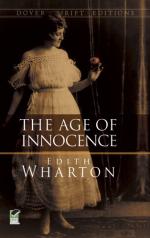“Well—?” he questioned, sitting down on the bench, and looking up at her with a frown that he tried to make playful.
She dropped back into her seat and went on: “You mustn’t think that a girl knows as little as her parents imagine. One hears and one notices—one has one’s feelings and ideas. And of course, long before you told me that you cared for me, I’d known that there was some one else you were interested in; every one was talking about it two years ago at Newport. And once I saw you sitting together on the verandah at a dance— and when she came back into the house her face was sad, and I felt sorry for her; I remembered it afterward, when we were engaged.”
Her voice had sunk almost to a whisper, and she sat clasping and unclasping her hands about the handle of her sunshade. The young man laid his upon them with a gentle pressure; his heart dilated with an inexpressible relief.
“My dear child—was that it? If you only knew the truth!”
She raised her head quickly. “Then there is a truth I don’t know?”
He kept his hand over hers. “I meant, the truth about the old story you speak of.”
“But that’s what I want to know, Newland—what I ought to know. I couldn’t have my happiness made out of a wrong—an unfairness—to somebody else. And I want to believe that it would be the same with you. What sort of a life could we build on such foundations?”
Her face had taken on a look of such tragic courage that he felt like bowing himself down at her feet. “I’ve wanted to say this for a long time,” she went on. “I’ve wanted to tell you that, when two people really love each other, I understand that there may be situations which make it right that they should—should go against public opinion. And if you feel yourself in any way pledged . . . pledged to the person we’ve spoken of . . . and if there is any way . . . any way in which you can fulfill your pledge . . . even by her getting a divorce . . . Newland, don’t give her up because of me!”
His surprise at discovering that her fears had fastened upon an episode so remote and so completely of the past as his love-affair with Mrs. Thorley Rushworth gave way to wonder at the generosity of her view. There was something superhuman in an attitude so recklessly unorthodox, and if other problems had not pressed on him he would have been lost in wonder at the prodigy of the Wellands’ daughter urging him to marry his former mistress. But he was still dizzy with the glimpse of the precipice they had skirted, and full of a new awe at the mystery of young-girlhood.
For a moment he could not speak; then he said: “There is no pledge—no obligation whatever—of the kind you think. Such cases don’t always—present themselves quite as simply as . . . But that’s no matter . . . I love your generosity, because I feel as you do about those things . . . I feel that each case must be judged individually, on its own




